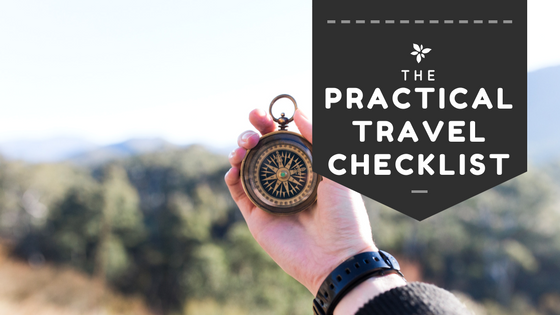
You’ve packed the suitcase. You’ve booked the hotel. But have you really thought of everything?
Take a few minutes to run through the practical checklist of items every traveler should cover — but can easily fall through the cracks. A little preparation goes a long way when it comes to venturing abroad, so make sure you’ve covered all the most important bases!
- Bring a way to backup your pictures. You’ll be making memories by the minute, and you’ll want to record them all. Not only will you be running through the memory capacity, though, but you’re never more likely to lose or misplace your electronics as when you’re traveling. Make sure that if misfortune strikes, you only lose the replaceable things, not your family memories.
- Double check your documents for errors. It never hurts to give the tickets and moving parts a once-over. Think very carefully about trying to squeeze in any short transit times when booking your connecting flights. It might seem worth it to try to save yourself a few precious hours of travel time, but if you’re incoming flight is behind schedule or your next gate is all the way in another terminal, you could end up adding hours upon hours and a huge amount of stress when you miss your connection! While you’re checking your flights…
- Remember the time differences. Don’t assume that the time differences between your arrival and departure points are automatically taken into account, especially if you’re using secondary transit like local trains. There’s nothing worse than a meticulously planned itinerary that you realize too late is entirely useless!
- Make copies! Once you’ve double checked all of your documents, you’ll want to make photocopies of all the important information. Keep these in a separate case from the originals, or on your person in a purse or wallet. Traveling and hotel-hopping is the easiest time to lose something — this way, you’ll still have your most important records. Make sure you have multiple copies of your plane tickets, your identification, your passport, your visa, your itinerary, and anything else you’d be in trouble without.
-
Then, share them with a friend. The buddy system really does work! Not only should you have all the important info, but so should a trusted friend or family member back home. Make sure someone that you can stay in contact with has your full itinerary, and copies of your most important documentation. Just in case anything goes wrong, it can be a huge help to have an informed advocate back home! They can follow along with your travels and make sure that you’re still safe and on track.
-
Don’t skimp on insurance. From the safety of your living room, it might seem like you can skate by without purchasing special traveler’s insurance. Once you’re far from home, however, you need to make sure all your bases are entirely covered to keep yourself safe and healthy in a foreign place. It’s more important than ever to be properly protected when you’re venturing outside your usual support network. Read up on what to look for in traveler’s insurance and make sure you’re covered for all the important things, like lost baggage, travel delays or cancellation, medical emergencies, etc. That way, if something does go wrong, it’ll be a blip on your otherwise incredible trip, rather than the moment your vacation was ruined.
-
Exchange in advance. If you’re going to be making any large currency exchanges — and even if you’re planning on relying on credit cards, it can be very useful to carry a little cash — it’s smart to do this before you board the plane. For one, it’ll be one less thing to worry about when you land sleep deprived and disoriented. More importantly, you’ll find you can almost always get a better exchange rate at your home bank than at the airport kiosks, or even at exchange locations at your destination.
-
Learn the rules of credit. If you’re planning on bringing a credit card (and you should, even if only for emergencies), you’ll want to familiarize yourself with the traveler’s policies for your card. Many cards carry hidden foreign charges that you might not be aware of, and even small fees for foreign purchases can really add up when you’re traveling. Make sure you know what you’re signing up for, and if you travel often or will be gone long time, consider applying for a new card that is especially good or foreign purchases.
-
Talk to the bank first. No matter what card you’re taking with you, it’s absolutely crucial that you reach out to your bank prior to leaving and loop them in on your plans. If you don’t share your itinerary, they’ll likely freeze your account when it is suddenly flooded with charges in Fiji. The last thing you want to be dealing with on your vacation is a maze of automated menus as you try to re-access your accounts, so do yourself a favor and call them now with your travel plans and dates.

